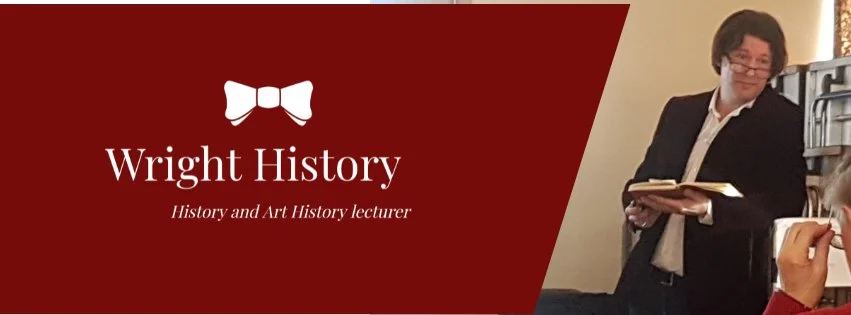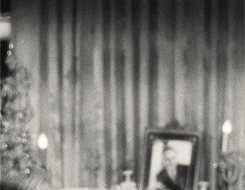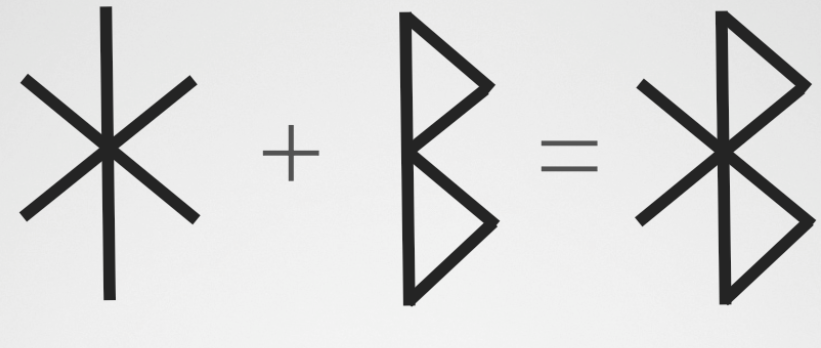Wright History goes social!
Harald Bluetooth. Kind of. Well… not at all, but nevertheless relevant**
Well here we are - with yet more exciting news…
[in smooooth Robertian voice: (TM)] “Well hellooo. I’ll be your lecturer for the next two hours…”
We have finally carved out enough time in our waking hours to venture into the Realms of Facebook!
If those of you who dabble in the Book of Face would like to see our shiny new business page, you’ll find it here: https://www.facebook.com/wrighthistorycourses/
It’s fair to say that there’s unlikely to be anything there just now which you don’t already know, but that will change soon, as I get to post more. But if you would be willing to like or follow us, we’d be extremely grateful. Heck, should you feel so inclined, do please free to post something on our page … or even point it out to a friend or two who may be interested in what we do.*
* Shameless? Moi?? Mais oui. We’ve met, right…?
My preliminary spies inform me that we don’t always come up in the search box within Facebook, so for now at least the url is the safest way to find us. But as you may know, Facebook is all about the algorithms, so with luck, a tailwind behind us, and your goodwill, we might start to claw our way into those algorithms.
Theoretically, Facebook could provide us with a community space other than Readers’ corner - i.e. a place in which you can share your recommendations for exhibitions, novels, films, or places to visit, etc., which are relevant to a course you’ve done with other Denizens of Wright History. This is something which many of you have said would be useful, but alas I’ve yet to find a way of doing it well which doesn’t cost a lot more than we can currently afford.
Then again, this wouldn’t work for those of you who don’t facebook. There is, I know, a way to link our Facebook page to our website. This may solve this problem and allow everyone to see all of your wonderful recommendations, but working out how to link them is beyond my current know-how, so is on my Things To Learn list. For now, it’ll be interesting to see if/how a Facebook presence may be of use to anyone…
So that’s our news.
Thank you in advance if you’re willing and able to help us crack the algorithms!
**[Fun Fact: You may have noticed that I headed this post with a shamelessly anachronistic image. On this occasion at least, however, there is a good reason for doing so - and a historical one at that…
The image is based on one of two important tenth-century runic stones, known as the Jelling stones, which are the main attraction at a UNESCO World Heritage Site in Denmark, and associated with Haraldr Gormsson - King of Denmark and Norway, d. 985/86, and subsequently known as Harald Blåtand, i.e. Harald Bluetooth.
And yes - if you don’t already know it, you’ll probably be wondering… there is indeed a direct connection to Bluetooth technology, which we all use so much these days - not least to check in on Facebook.***
***[See? There is a good reason for my using it!]
Harald and the Jelling stones loom large in the Danish national story.
Traditionally, Harald is held to have consolidated Danish royal authority over hitherto troublesome regions, introduced Christianity to Denmark, and united Denmark and Norway. Given other historical evidence, none of these things can be unequivocally laid at Harald’s own door, but that need not worry us here.
It presumably wouldn’t have worried Harald either, given that the inscription on his Jelling stone records that he ‘won for himself all of Denmark and Norway and made the Danes Christian’.
If you’re going to have an origin myth, having it literally cast in stone isn’t a bad starting point.
For our present purposes, the headline news is that Harald and the Jelling stones are prominent in the Danish national consciousness. Harald is widely held to be the father of Denmark, and his stone is its “birth certificate”.
The reason for his (very) posthumous moniker is similarly murky. The most frequent explanations are (a) that he had a very visible rotten tooth; and (b) that ‘blue tooth’ refers to his having peacefully reconciled disparate factions (think silver-tongued).
Fast-forward to the mid-1990s… Jim Kardach, one of the founders of Bluetooth SIG, came across King Manky-Nasher in his silver-tongued-communicator iteration. Harald Bluetooth had established a common ground and common purpose via Christianity, and got Denmark and Norway together. What better metaphor for getting laptops and mobile phones to communicate with each other, and, moreover, for convincing people that it was worth doing? He doodled on an illustration of the Jelling Christ, giving Him a laptop and a mobile phone. The concept was not instantly popular with the decision-makers, but eventually won the day.]
[Bonus Fun Fact: The Bluetooth logo is also an homage to Harald, in that it depicts a combined form of his initials - H ( ᚼ ) and B ( ᛒ ).]
Anyway… back to our foray into social media…
Once we’ve got an idea of whether there’s interest from current or potential Denizens of Wright History, the next thing on our to-do list is LinkedIn or Twitter. Do any of you use either of those? And what about Instagram or Pinterest? My guess is that Twitch and TikTok don’t figure prominently in your social media activity, but I’m happy to be corrected! Chances are that if you’re using a particular platform, others with similar interests will be too, so any pointers so we can try to reach them would be most welcome! Or do you avoid all social media like the plague?
Do please let us know below!








